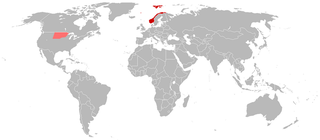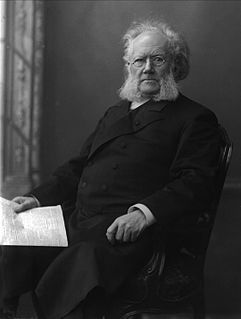
Skien[²ʃeːən](listen) is a city and municipality in Telemark county, Norway. It is part of the traditional region of Grenland. The administrative centre of the municipality is the city of Skien. Skien is also the administrative centre of Telemark county.
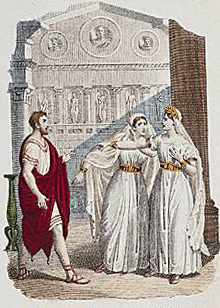
Norma is a tragedia lirica or opera in two acts by Vincenzo Bellini with libretto by Felice Romani after the play Norma, ou L'infanticide by Alexandre Soumet. It was first produced at La Scala in Milan on 26 December 1831.
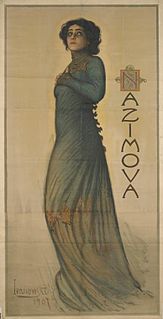
Hedda Gabler is a play written by Norwegian playwright Henrik Ibsen. Ibsen was present at the world premiere, which took place on 31 January 1891 at the Residenztheater in Munich. It is recognized as a classic of realism, nineteenth century theatre, and world drama. The title character, Hedda, is considered one of the great dramatic roles in theatre.
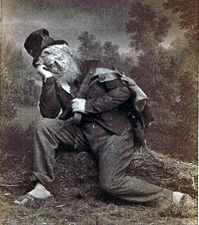
Peer Gynt is a five-act play in verse by the Norwegian dramatist Henrik Ibsen published in 1867. Written in Danish—the common written language of Denmark and Norway in Ibsen's lifetime—it is one of the most widely performed Norwegian plays. Ibsen believed Per Gynt, the Norwegian fairy tale on which the play is loosely based, to be rooted in fact, and several of the characters are modelled after Ibsen's own family, notably his parents Knud Ibsen and Marichen Altenburg. He was also generally inspired by Peter Christen Asbjørnsen's collection of Norwegian fairy tales, published in 1845.

Ghosts is a play by the Norwegian playwright Henrik Ibsen. It was written in 1881 and first staged in 1882 in Chicago, Illinois, in a production by a Danish company on tour. Like many of Ibsen's plays, Ghosts is a scathing commentary on 19th-century morality. Because of its subject matter, which includes religion, venereal disease, incest, and euthanasia, it immediately generated strong controversy and negative criticism. Since then the play has fared better, and is considered a “great play” that historically holds a position of “immense importance”. Theater critic Maurice Valency wrote in 1963, "From the standpoint of modern tragedy Ghosts strikes off in a new direction.... Regular tragedy dealt mainly with the unhappy consequences of breaking the moral code. Ghosts, on the contrary, deals with the consequences of not breaking it."

The Cemetery of Our Saviour is a cemetery in Oslo, Norway, located north of Hammersborg in Gamle Aker district. It is located adjacent to the older Old Aker Cemetery and was created in 1808 as a result of the great famine and cholera epidemic of the Napoleonic Wars. Its grounds were extended in 1911. The cemetery has been full and thus closed for new graves since 1952, with interment only being allowed in existing family graves. The cemetery includes five sections, including Æreslunden, Norway's main honorary burial ground, and the western, southern, eastern and northern sections. The Cemetery of Our Saviour became the preferred cemetery of bourgeois and other upper-class families. It has many grand tombstones and is the most famous cemetery in Norway.
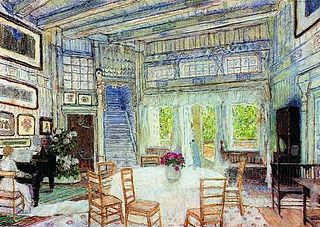
The Lady from the Sea is a play written in 1888 by Norwegian playwright Henrik Ibsen inspired by the ballad Agnete og Havmanden. The drama is notable in the Ibsen corpus for introducing the portrayal of Hilde Wangel who is again portrayed in Ibsen's later play The Master Builder. The character portrayal of Hilde Wangel has been portrayed twice in contemporary film as a culturally relevant portrayal, most recently in the 2014 film titled A Master Builder.

John Gabriel Borkman is the second-to-last play of the Norwegian playwright Henrik Ibsen, written in 1896.

Suzannah Ibsen was a Norwegian woman who was the wife of playwright and poet Henrik Ibsen and mother of noted politician Sigurd Ibsen.
Events in the year 1930 in Norway.
Events in the year 1850 in Norway.
Andhrimner was a literary and satirical weekly magazine, issued from January to September 1851 in Kristiania, Norway.
Maria Tryti Vennerød is a Norwegian playwright.

Paul Botten-Hansen was a Norwegian librarian, book collector, magazine editor and literary critic.

Illustreret Nyhedsblad was a Norwegian weekly magazine, issued from 1851 to 1866 in Christiania, Norway. Its first editor was Paul Botten-Hansen, who edited the magazine from 1851 to 1864 and from 1865 to 1866, with Frederik Bætzmann being editor from 1864 to 1865. Among its contributors were Bjørnstjerne Bjørnson, Henrik Ibsen, Ernst Sars and Camilla Collett. Ibsen's plays Hærmændene paa Helgeland and Kærlighedens komedie were published as supplements to the magazine.
Nora Bergliot Ibsen is a Norwegian theatrical producer, noted for being the producer of the 2006 Ibsen Year, Norway's major anniversary of playwright Henrik Ibsen's death 100 years earlier, including high profile celebrations in multiple countries. The Ibsen Year was one of the Norwegian government's major cultural undertakings in 2006, aimed at increasing appreciation of Henrik Ibsen and Norwegian culture internationally. The Ibsen Year comprised 8213 separate cultural events, and 83 countries took part in the commemoration.
Grusomhetens Teater is a Norwegian theatre company based in Oslo's Hausmania cultural centre. The company produced its first performance in collaboration with Trøndelag Teater in 1989, and was established as an independent group in 1992. The theater's manager and director is Lars Øyno. In 2002 the theater company received support from the Norwegian Arts Council to launch its own performing space in Hausmania.

Peer Gynt is a 1938 opera by Werner Egk to a libretto after the play Peer Gynt by Henrik Ibsen. The premiere took place on 24 November 1938 at the Berliner Staatsoper where Egk was the conductor at the time.
